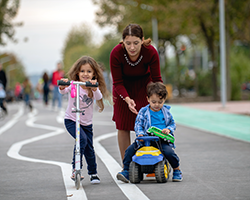Republic of Moldova launches campaign to raise awareness about vaccines and encourage catch up on missed immunizations

WHO
A national 1-year awareness-raising campaign — Vaccinează copiii, protejează-ți viitorul! (Vaccinate children, protect your future!) – has been launched in the Republic of Moldova to address misperceptions among the general public and reverse a decreasing trend in uptake for some routine vaccines. At the same time, health authorities aim to encourage the public to catch up on any vaccination doses missed before or during the COVID-19 pandemic.
Nearly all immunization services in the Republic of Moldova were halted nationwide from late March to mid-May as part of broader interruptions to health services. Preliminary data show that coverage for several vaccines decreased by up to 10% in the first 3 quarters of this year, compared to the same period last year.
Many families were impacted by the interruptions, which has left some children at risk of contracting vaccine-preventable diseases, while parents are also concerned about protecting them from COVID-19.
Restrictions were gradually lifted starting in mid-May, and all immunization services have resumed. However, to prevent a resurgence of vaccine-preventable diseases, such as measles, resuming services is not enough. All scheduled doses that were missed for any reason in the past months will also need to be caught up. In response, in August, the Ministry of Health, Labour and Social Protection; the National Public Health Agency; WHO; and the United Nations Children’s Fund (UNICEF) together launched a range of activities to reach out to all parents, grandparents and caregivers to encourage them to catch up with routine immunizations, while reminding them of the benefits of vaccines and dangers of myths and false information.
In co-launching the campaign, Dr Igor Pokanevych, WHO Representative in the Republic of Moldova, said: “Immunization is one of the most effective public health interventions we have, an instrument that protects children from serious diseases. We cannot allow the COVID-19 pandemic to cause the collateral damage of outbreaks against which we have effective vaccines”. Desiree Jongsma, UNICEF Country Representative in the Republic of Moldova, pledged unconditional support for the joint efforts to guarantee access to vaccines.
Campaign activities
A dedicated official webpage and a series of videos and infographics, in both Russian and Romanian, explain vaccines’ benefits, use and ingredients, as well as the successful results of the National Immunization Programme. Prior to developing communication materials and activities, a qualitative study based on focus group discussions was initiated to understand people’s perceptions, beliefs and concerns related to immunization, so these could be addressed during the campaign.
In addition to educating the public, training programmes for all health-care workers have been initiated to ensure that primary health services can resume with the necessary precautions in place to prevent the spread of COVID-19.
One of the campaign’s supporters is a well-known comedian and social media influencer who has developed a video to promote the campaign. To date, the video has received over 1 million views.
Status of routine immunization and measles transmission
In 2019, the Republic of Moldova achieved 91% immunization coverage for the first and third doses of the diphtheria-tetanus-pertussis vaccine. However, this means that nearly 1 in 10 babies did not receive their first and third doses of the vaccine on time according to the national schedule. Viorica Dumbrăveanu, Minister of Health, Labour and Social Protection emphasized: “The whole of society, but also each of us, must be aware of the devastating effects that some infectious diseases can have. It is important to understand that vaccination protects not only the person who is vaccinated, but also other people through collective immunity”.
Looking forward
The next phase of the campaign will see increased involvement of state institutions, private companies and public figures. It will include organization of a national immunization week in schools in order to create a greater understanding of immunization and sustained demand for vaccines.



